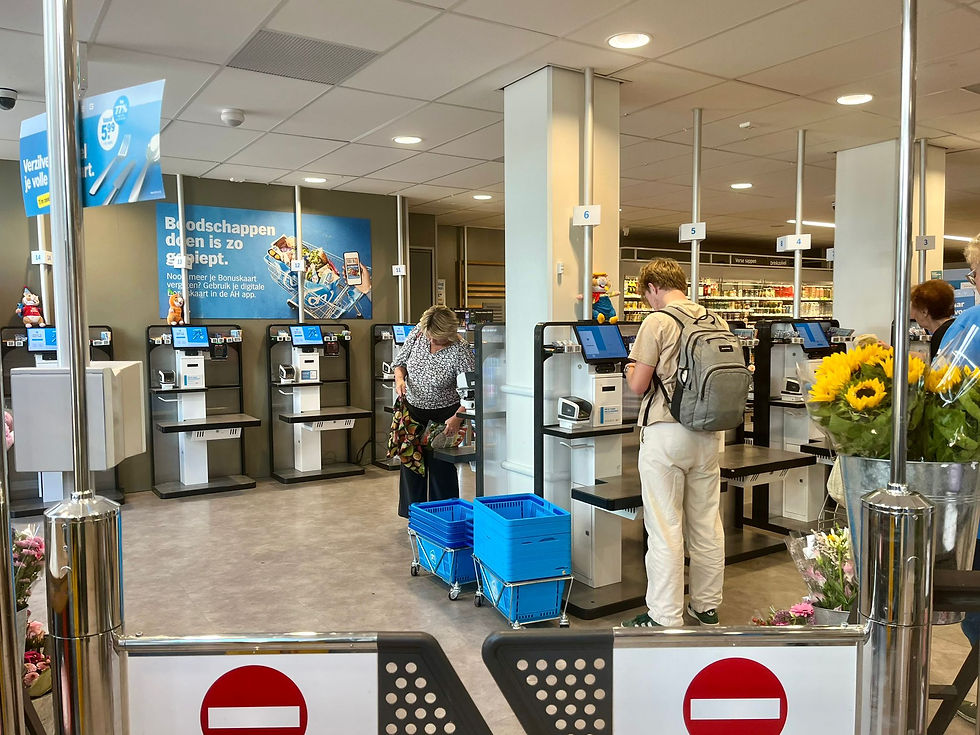Supermarkets Take Action to Stop the Shoplifting Craze
- Daniela Ivančáková

- Jun 20
- 4 min read

Shoplifters were put under the microscope by supermarket chains in the Netherlands after police figures showed an increase in shoplifting by 15% two years ago. Big chains like Jumbo, Albert Heijn and Lidl try to tackle the situation, while the city of Groningen, where the sharpest increase in the country was recorded, remains divided in its views on the matter.
Increasing numbers
In the Netherlands, 97% of theft happens at supermarkets, based on survey by RTL Nieuws and every tenth person does not scan all items at self-checkouts, EenVandaag reports. In 2023, shoplifting cost Jumbo an estimate of 100 million euros. In the same year, Groningen appeared at the top of according to local police, with a 40% increase compared to the previous year.
Since then, supermarket chains as well as CBL (Central Bureau for Food Trade in the Netherlands) have been trying to tackle the problem, which resulted in a slight improvement in last year’s figures.

Tackling the issue
Last year, Jumbo tested various strategies to discourage shoplifters, “from technological adjustments to conspicuous communication to kindly reminding customers to pay for their groceries,” according to their 2024 annual report. Strategies include heightened camera surveillance and more frequent random controls at self-checkouts or even testing Artificial Intelligence tools.
This year, however, the approach changed again. “The measures should not be at the expense of the shopping experience or customer friendliness,” informs Jumbo’s press office. The supermarket chain ended the testing of AI and even introduced the Jumbo Prize Wheel (Jumbo Winwiel geïntroduceerd). Customers can spin the wheel to win a free product or a small gift as compensation for the delay caused by random checks. Despite that “shopping at Jumbo should above all remain fun”, the chain plans on continuing the investigation of which technologies and strategies are most effective in reducing shoplifting incidents.
CBL, on the other hand, works to ensure a smooth process of reporting incidents, stating “Shopkeepers and the police can work together on this” in their 2024 Position Paper on the increase in nuisance, aggression and violence on the shop floor.
“What does a one-euro chocolate bar mean to Albert Heijn and what does it mean to somebody who is starving?”
In court
To see the process after the supermarket pressed charges, The Glass Room went to a hearing at Rechtbank Noord-Nederland for a shoplifting case.
Shoplifters adapt
The new strategies did not go unnoticed by shoplifters. “There is so much more staff observing you at the self-scanning. And I don’t know if you noticed, but it takes a while now until it lets you through to payment. I think they started counting how many items you beep,” says Jesse. He shoplifts for financial reasons and usually steals towards the end of the month while waiting for his paycheck. “It’s not as easy as it used to be. The kids who check you did not care that much, but like over the last year, it changed.”
Before the stricter organization policies, Jesse used the “classic way” to shoplift - simply acting to have forgotten to scan. But just like supermarkets, he adjusted his strategies. “It’s too risky not to scan something because they always stand behind you. Now what I do is, I usually just slip it into my pocket or under my jacket if it’s like a bigger thing.” In doing so, he looks out for the cameras and employees. “It used to be so scary for me, the adrenaline rush and everything, but now I got used to the feeling. I don’t do it for adrenaline, though, like some people that I know. I do it to save money.”
The moral reasoning
For him, stealing from large corporations is not that difficult to justify. “What does a one-euro chocolate bar mean to Albert Heijn and what does it mean to somebody who is starving?” He also distinguishes between shoplifting expensive items and basic necessities, like bread or sunflower oil. When he shoplifts, he always go for the cheapest option. "I consider myself an ethical shoplifter," he laughs.
Despite the joking, Jesse also emphasizes how financially difficult it is to be an international student in the city. The rents are way higher than in the home countries of many students and without fluent Dutch, it is difficult to get a job. The money he saves on shoplifting usually goes into his rent, flight tickets back home, and tuition fees. "It's like when you get the notification from the bank that your rent money were deducted, that's when I'm like no, I don't regret doing it," he tells The Glass Room.
Crime or a human right?
Opinions on shoplifting vary, some see it as justifiable, while others strongly condemn it. In Groningen, people like Jesse defend it with arguments revolving around the wealth of large corporations, but there are also many who remain skeptical. Listen to what the citizens of Groningen think about the issue.
The name of the person interviewed here is fake; the real name is known to the editorial staff.


Comments